8 start with G start with G
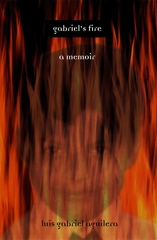
Aguilera's memoir is not just an account of race relations and street life in the inner city, nor of the plight of the immigrant and the dilemma of class identity for a "minority" family. Gabriel's Fire also movingly recounts the peculiarly daunting and inspiring moments of a particular age, riddled with confusion, desires, and duties and recorded by an exceptionally observant and articulate young man. Aguilera writes that he "grew into" the English language when he was eleven or twelve, and his recollections reflect his newfound delight with words—the conversations, arguments, taunts, song lyrics, and casual interchanges of his youth are rendered here with an immediacy and directness rare in contemporary memoirs.
Both a picture of American culture of the 1980s and 1990s and a coming-of-age story, Gabriel's Fire counters mainstream and mass-mediated images of the inner city, Hispanic culture, and troubled youth. In its honesty and energy, it is a poignant and compelling story of one man's formative years.
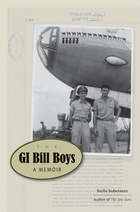
In her warm and witty new memoir, Stella Suberman charms readers with her personal perspective as she recalls the original 1940s GI Bill. As she writes of the bill and the epic events that spawned it, she manages, in her crisp way, to personalize and humanizes them in order to entertain and to educate. Although her story is in essence that of two Jewish families, it echoes the story of thousands of Americans of that period.
Her narrative begins with her Southern family and her future husband’s Northern one – she designates herself and her husband as “Depression kids” – as they struggle through the Great Depression. In her characteristically lively style, she recounts the major happenings of the era: the Bonus March of World War I veterans; the attack on Pearl Harbor; the Roosevelt/New Deal years; the rise of Hitler’s Nazi party and the Holocaust; the second World War; and the post-war period when veterans returned home to a collapsed and jobless economy. She then takes the reader to the moment when the GI Bill appeared, the glorious moment, as she writes, when returning veterans realized they had been given a future.
As her husband begins work on his Ph.D., she focuses on the GI men and their wives as college life consumed them. It is the time also of Senator Joseph McCarthy and the “Red Scare,” of the creation of an Israeli state, of the Korean War, and of other important issues, and she discusses them forthrightly. Throughout this section she writes of how the GI’s doggedly studied, engaged in critical thinking (perhaps for the first time), discovered their voices. As she suggests, it was not the 1930’s anymore, and the GI Bill boys were poised to give America an authentic and robust middle class.
Stella Suberman is the author of two popular and well-reviewed titles: The Jew Store and When It Was OurWar. In its starred review, Booklist called The Jew Store “an absolute pleasure,” and The Atlanta Journal-Constitution wrote that it was “valuable history as well as a moving story.” When It Was Our War received a starred review from Publishers Weekly, and in another starred review, Kirkus Reviews described it as “Engaging . . . A remarkable story that resonates with intelligence and insight.” Mrs. Suberman lives with her husband, Jack, in Chapel Hill, North Carolina.
In her warm and witty new memoir, Stella Suberman charms readers with her personal perspective as she recalls the original 1940s GI Bill. As she writes of the bill and the epic events that spawned it, she manages, in her crisp way, to personalize and humanizes them in order to entertain and to educate. Although her story is in essence that of two Jewish families, it echoes the story of thousands of Americans of that period.
Her narrative begins with her Southern family and her future husband’s Northern one – she designates herself and her husband as “Depression kids” – as they struggle through the Great Depression. In her characteristically lively style, she recounts the major happenings of the era: the Bonus March of World War I veterans; the attack on Pearl Harbor; the Roosevelt/New Deal years; the rise of Hitler’s Nazi party and the Holocaust; the second World War; and the post-war period when veterans returned home to a collapsed and jobless economy. She then takes the reader to the moment when the GI Bill appeared, the glorious moment, as she writes, when returning veterans realized they had been given a future.
As her husband begins work on his Ph.D., she focuses on the GI men and their wives as college life consumed them. It is the time also of Senator Joseph McCarthy and the “Red Scare,” of the creation of an Israeli state, of the Korean War, and of other important issues, and she discusses them forthrightly. Throughout this section she writes of how the GI’s doggedly studied, engaged in critical thinking (perhaps for the first time), discovered their voices. As she suggests, it was not the 1930’s anymore, and the GI Bill boys were poised to give America an authentic and robust middle class.
Stella Suberman is the author of two popular and well-reviewed titles: The Jew Store and When It Was Our War. In its starred review, Booklist called The Jew Store “an absolute pleasure,” and The Atlanta Journal-Constitution wrote that it was “valuable history as well as a moving story.” When It Was Our War received a starred review from Publishers Weekly, and in another starred review, Kirkus Reviews described it as “Engaging . . . A remarkable story that resonates with intelligence and insight.” Mrs. Suberman lives with her husband, Jack, in Chapel Hill, North Carolina.
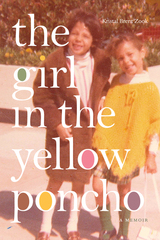
The Girl in the Yellow Poncho is Zook’s coming-of-age tale about what it means to be biracial in America. Throughout, she grapples with in-betweenness while also facing childhood sexual assault, economic insecurity, and multigenerational alcoholism and substance abuse on both the Black and white sides of her family. Her story is one of strong Black women—herself, her cousin, her mother, and her grandmother—and the generational cycles of oppression and survival that seemingly defined their lives.
Setting out on an inner journey that takes her across oceans and continents, Zook tells the story of a little girl who never gives up on love, even long after it seems to have been destroyed. In the end she triumphs, reconciling with her father and mother to create the family of her dreams through forgiveness and sheer force of will. A testament to the power of settling into one’s authentic identity, this book tells a story of a daughter’s lifelong yearning, a mother’s rediscovery of lost love, and the profound power of atonement and faith to heal a broken family.
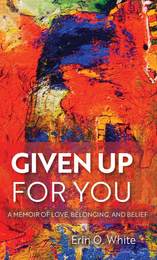
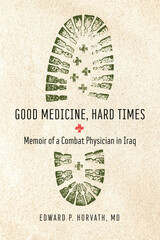
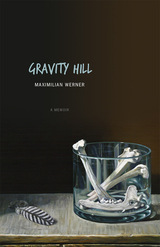
“The sound of parenthood is the sigh.” So begins Gravity Hill, written from the perspective of a new father seeking hope, beauty, and meaning in an uncertain world. Many memoirs recount the author’s experiences of growing up and struggling with demons; Werner’s shows how old demons sometimes return on the heels of something as beautiful as children. Werner’s memoir is about growing up, getting older, looking back, and wondering what lies ahead—a process that becomes all the more complicated and intense when parenting is involved. Moving backward and forward between past, present, and future, Gravity Hill does not delineate time so much as collapse it.
Werner narrates his struggle growing up in suburban Utah as anon-Mormon and what it took for him, his siblings, and his friends to feel like they belonged. Bonding in separation, they indulged in each other, in natural and urban landscapes, and sometimes in the destructive behaviors that are the native resort of outsidersincluding promiscuous and occasionally violent sexual behavior—and for some, paths to death and suicide. Gravity Hill is the story of the author’s descent into and eventual emergence from his dysfunction and into a newfound life. Infused with humor, honesty, and reflection, this literary memoir will resonate with readers young and old.

When Barney Clark received the Jarvik-7 artificial heart in 1983 and Cold Fusion came under fire in 1989, Chase Peterson, as the University of Utah president, was inevitably pulled into these campus events. While these episodes may be the best known in Peterson’s professional history, they are certainly not the only stories that make his autobiography worth reading.
The Guardian Poplar tells of a man who grew up in small-town Utah and carried his pioneer and Mormon heritage to a New England prep school and later to Harvard. He then returned to Utah as a doctor, but unexpectedly found himself back at Harvard as its dean of admissions, handling issues such as the Vietnam War and racial and gender reform. The book explains how Peterson’s home state recruited him back to become an administrator at the University of Utah and how he would eventually become the university president, taking on new issues and challenges. Peterson recounts these years by drawing on anecdotes that recall the people he served and the moments that brought his life meaning.
This autobiography is a compelling account of how Peterson has managed to balance family and career, handle the tensions that have arisen between his faith and his scientific training, and remain solid in the face of his newest challenge—cancer. The book’s engaging prose and honest reflections are sure to intrigue and inspire readers who know the man well, as well as those readers who simply want to know a man who can be described as dedicated, faithful, hardworking, and hopeful about the future.
“When I first met Chase Peterson as a Harvard freshman—along with our joint friend and brother David Evans—something deeply touched me. It was not only his sincere smile and open embrace but also a sense that here was a kind and courageous man comfortable in his own skin, secure in who he was yet eager to encounter new persons, new experiences, and new challenges. . . . He was from Utah but in New England, a Mormon in old Harvard, and a medical doctor in the deanship of admissions. Little did I know that his journey would enhance and enrich my own—owing to his critical allegiance to his family, his faith, his friends, and to his citizenship of country and world. His prophetic witness at Harvard in the turbulent ‘60s and ‘70s, his promotion of black priesthood in the Mormon church, his support of antiapartheid protests in the ‘80s, and his steadfast defense of academic freedom in the Cold Fusion controversy in the early ‘90s all express his quiet and humble effort to be true to himself—a self grounded in, but
not limited by, a rich Mormon tradition.”—from the foreword by Cornel West
READERS
Browse our collection.
PUBLISHERS
See BiblioVault's publisher services.
STUDENT SERVICES
Files for college accessibility offices.
UChicago Accessibility Resources
home | accessibility | search | about | contact us
BiblioVault ® 2001 - 2024
The University of Chicago Press









